Stories > Trailblazers of Change
Trailblazers of Change
The Singapore International Foundation’s Young Social Entrepreneurs programme celebrated its 10th anniversary with changemakers who have transformed communities for the better.
BY HWEE HWEE TAN
2019 study by the Thomson Reuters Foundation, which ranks countries in order of their conduciveness for social enterprises, has placed Singapore top in Asia – and fifth behind Canada, Australia, France and Belgium. A shake-up is afoot in the business landscape around the world in which millennial and Gen Z changemakers are increasingly eager to explore commercial opportunities that allow them to effect positive change in society.
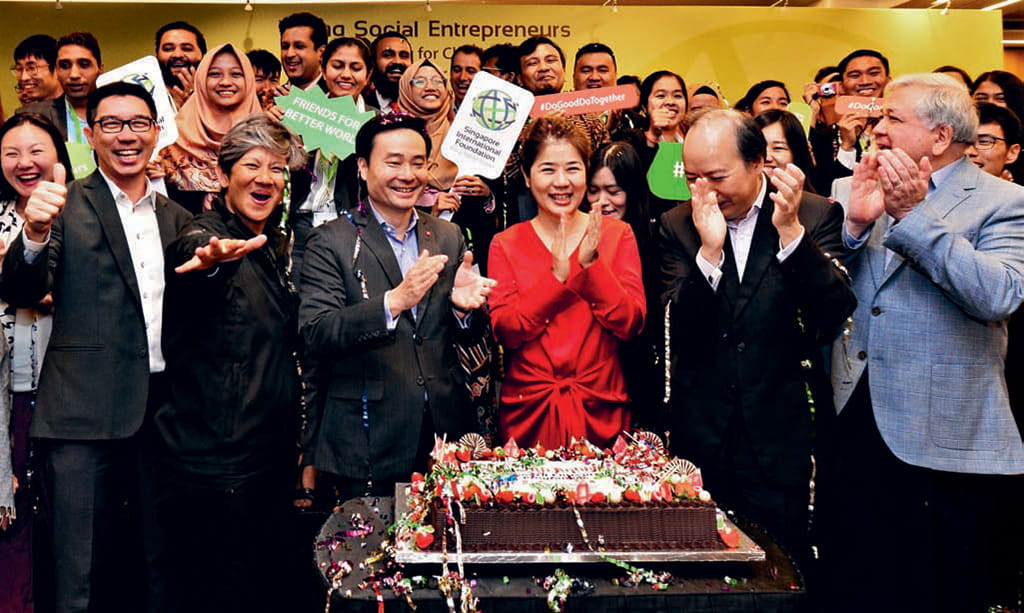
SIF governors Shee Tse Khoon (third from left), associate professor Peter Pang (second from right) and SIF executive director Jean Tan (centre) along with the winning teams and judging panel.
But achieving a balance between profitability and social impact -- all while trying to scale – can be a trial for social enterprises, especially those in nascent stages of growth. And it is this challenge that the Singapore International Foundation (SIF)’s Young Social Entrepreneurs (YSE) programme has attempted to overcome – by equipping budding young changemakers with the requisite knowledge and networks.
In 2019, the signature SIF programme marked a decade of nurturing and supporting social enterprises from around the world.
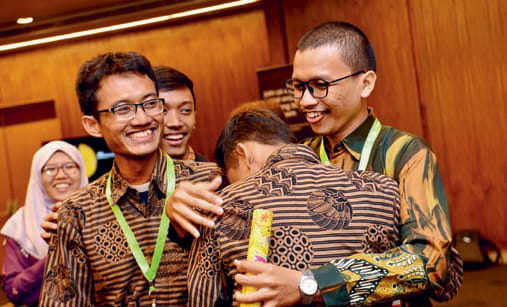
Founders of Indonesiabased Nyampah Corporation, which was one of the YSE 2019 winners.
YOUNG CHANGEMAKERS
“In 2010, the Singapore International Foundation started the Young Social Entrepreneurs programme because we recognised that our youth care deeply about social and environmental issues, and want to use their skills to make a positive impact on the world,” said SIF executive director Jean Tan. “We simply tapped into the passion and growing influence wielded by the youth, to equip and enable them with the skill sets and networks to start or scale social enterprises in Singapore and beyond. Today, the YSE network of 1,106 young changemakers with social enterprises in over 30 countries is a ‘force for good’.”
From a three-day workshop in its early days, the programme has grown into an eight-month incubation programme complete with workshops, a mentorship scheme, overseas study visits and an opportunity to pitch for funding. Its series of overseas workshops, first launched in 2016 to better reach communities of changemakers outside of Singapore, has established a strong presence in Jakarta, Mumbai, Kuala Lumpur, Bangalore and Shanghai. It also counts over 150 multi-sectorial partners and friends among its network.
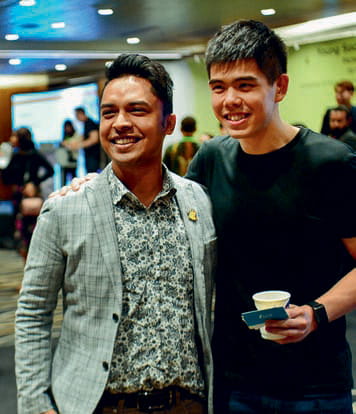
Carousell founder and YSE 2010 alumnus Quek Siu Rui (in black) with YSE 2014 alumnus Sazzad Hossain from SDI Academy.
YSE’s 10th anniversary was marked by Pitching for Change 2019, which saw the latest cohort of global changemakers – from Bangladesh, Cambodia, India, Indonesia, Malaysia, New Zealand, Pakistan, Singapore and Thailand – presenting their social enterprise ideas to a panel of judges.
These covered impact areas such as mental health services, sustainable waste management, provision of skills and technology for people with disabilities and underserved communities, water conservation, as well as youth empowerment. Six teams emerged tops and received up to S$20,000 each in seed funding.
Another highlight was a Fireside Chat with YSE 2010 alumnus Quek Siu Rui, chief executive officer and founder of digital marketplace Carousell. “If there’s one thing I could do, it is to render the terms ‘entrepreneurship’ and ‘social entrepreneurship’ as synonymous,” he said. “Both require a sustainable business model, and a good business is most sustainable when it is doing good for the community.”
He wrapped up the session with Carousell’s vision of success in the next 10 years: creating a world where second-hand items become a first choice. “I believe that this would make the world a greener and more meaningful place,” he concluded.
“The Programme Was Successful In Familiarising Us With One Another, Turning Us Into One Big Family. While Every Team’s Story Is Unique, We Feel Connected In Many Ways And Look Forward To Continued Engagement With The Yse Network After The Programme,” Say The Founders Of Indonesia’s Nyampah Corporation.
EMPOWERING NETWORK
Demonstrating the strength of the YSE network, former alumni – such as Inclusive Arts Movement, which curates digital content for differently abled performing artistes; and SDI Academy, an ed-tech organisation that aims to empower migrant workers with language, vocational and IT skills – participated as “books” at a Human Library session. Entitled “Breaking Barriers”, each “book”, paired with its respective community member, shared how it broke societal and physical barriers in pursuing its social missions.
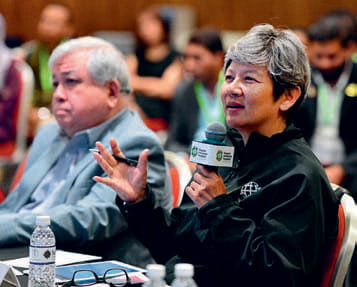
Entrepreneur Elim Chew, a long-time YSE mentor and one of the judges at the Pitching for Change programme, speaks at the event
To commemorate the occasion, the SIF commissioned a study on the impact of YSE. It covered shortlisted and winning alumni from 2012 to 2017 over a time frame of three years. Among these, 20 alumni were selected at random to represent the research population in terms of geography, sector and year of participation.
Key findings demonstrate the programme’s overall success, with 86 per cent of funded teams remaining in operation and over 70 per cent still actively making a positive impact.
Participants reported gaining a good mix of hard and soft abilities, including entrepreneurial know-how, heightened self-confidence, pitching and interpersonal skills, not to mention quality networks and connections. The study visit, mentorship and funding were named as the three most valued components of the programme – with 70 per cent of the winners stating that the funding provided was critical to the success of their social enterprise.
“A Good Business Is Most Sustainable When It Is Doing Good For The Community,” Says Carousell Founder And Yse 2010 Alumnus, Quek Siu Rui.
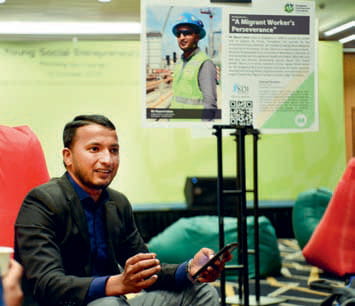
Nazrul Islam, a Bangladeshi migrant worker and community volunteer with the SDI Academy, shares his personal experiences.
They also credited the judging panel for improving their business strategies through constructive criticism. These enterprises were estimated to have generated over S$3.8 million worth of social value for employment. Last but not least, the SIF partnered with DBS Foundation to award the DBSF x SIF Social Impact Prize to three YSE alumni who have shown compelling achievements in their social entrepreneurial ventures post-programme. Assessed based on their business growth, social impact, potential scalability and contribution to the social enterprise sector, the winners include WateROAM from Singapore (2015), Ecodoe from Indonesia (2015) and Malaysia’s Langit Collective (2017).
Each received a S$10,000 prize. “I have learnt a lot from my fellow YSE peers who are with me on this social enterprise journey. It is remarkable that while every team’s story is unique, we feel connected in many ways, and I look forward to continued engagement with the YSE network after the programme,” said Ridho Awalludin Bimantara, co-founder of one of this year’s winning teams, Indonesia’s Nyampah Corporation. His teammate, Abu Muslim Alijauhari, agrees: “The programme was successful in familiarising us with one another, turning us into one big family.”
A DECADE OF NURTURING YSE CHANGEMAKERS FOR GOOD30COUNTRIES525SOCIAL ENTERPRISES1,106ALUMNIS$550KSEED FUNDING |
||
70%of shortlisted social enterprises are still in operation |
85.7%of funded social enterprises are still in operation |
75%of social enterprises grew from seed stage to start-up stage and beyond |
GAINING KNOW-HOW68%+ obtained a realistic and sustainable financial plan through programme mentorship 78% put in place robust and practical business strategies |
FOLLOWING THEIR HEARTS75% of social enterprises successfully achieved their social impact goals 76% remained in the social space three years after their participation |
 BUILDING CONNECTIONS57% credited programme media exposure and publicity for increasing their credibility with funders 94% felt the programme helped them in expanding networks and building relations |
OVERALL IMPACT 3.91+Social Return on Investment*3.8million dollars worth of social value for employment created |
||
|
+All the figures are based on a three-year study period of 20 alumni from 2012 to 2017, selected to represent the entire YSE cohort. *The Social Return on Investment assesses the effectiveness of the YSE programme by applying a proxy financial value to the social impact it generates for every dollar spent. |
||
A DECADE OF NURTURING YSE CHANGEMAKERS FOR GOOD30COUNTRIES525SOCIAL ENTERPRISES |
1,106ALUMNIS$550KSEED FUNDING |
70%of shortlisted social enterprises are still in operation |
85.7%of funded social enterprises are still in operation |
75%of social enterprises grew from seed stage to start-up stage and beyond |
GAINING KNOW-HOW68%+ obtained a realistic and sustainable financial plan through programme mentorship 78% put in place robust and practical business strategies |
FOLLOWING THEIR HEARTS75% of social enterprises successfully achieved their social impact goals 76% remained in the social space three years after their participation |
 BUILDING CONNECTIONS57% credited programme media exposure and publicity for increasing their credibility with funders 94% felt the programme helped them in expanding networks and building relations |
OVERALL IMPACT 3.91+Social Return on Investment*3.8million dollars worth of social value for employment created |
|
+All the figures are based on a three-year study period of 20 alumni from 2012 to 2017, selected to represent the entire YSE cohort. *The Social Return on Investment assesses the effectiveness of the YSE programme by applying a proxy financial value to the social impact it generates for every dollar spent. |
DOING WELL BY DOING GOOD
We speak to the winners of the DBSF x SIF Social Impact Prize on their journey from aspiring social enterprises to thriving impact-making ventures – and the people who supported them along the way.
LANGIT COLLECTIVE
Langit Collective was established in 2015 to solve fundamental problems faced by rural farmers in East Malaysia, including lack of market access, fluctuating prices and a fragmented supply chain. It does this by sourcing produce like rice, pepper and ginger directly from the farmers at a fair price, and promoting them in large urban markets. At least 35 per cent of the retail proceeds go directly to the farmers, with income generated by the company reinvested into the farming community through capacity building initiatives to ensure sustainability. Since its founding, Langit has paid RM235,000 (S$76,354) to 40 farmers, making a positive impact.
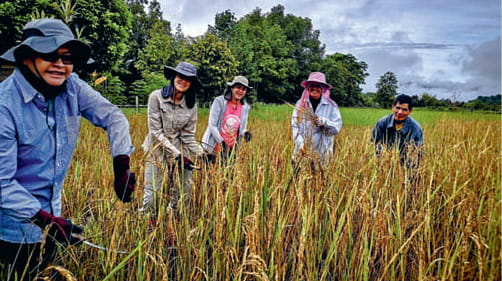
Social enterprise Langit Collective, a YSE 2017 alumnus, works with East Malaysia’s farming community and has brought into practice fair and transparent pricing and capacity building initiatives, all of which have created a positive impact and raised the farmers’ income.
For Langit’s chief marketing officer Melisa Lim, the YSE mentorship was one of the most valuable aspects of the programme. Her mentor, Clint Coo of Thailand-based Siam Organic, provided sound insights gleaned from similar work it did with small-scale farmers. This included a transparent price strategy whereby farmers know how much they stand to earn at every stage, from logistics to packaging. Another useful tip she picked up was the fair pricing system that lets the farmers decide the ceiling and floor prices, which eliminates hidden costs.
What makes the firm stand out from other social enterprises, according to Coo, is its patience and willingness to learn and adapt. He shares that many social enterprises – particularly those that work with farmers and annual crop cycles – require a commitment of several years before they start seeing results.
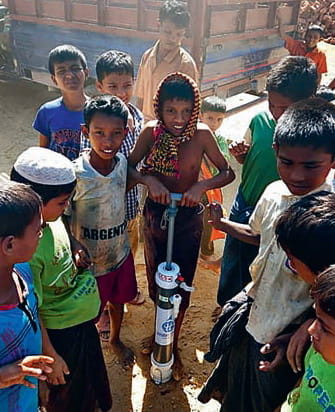
YSE 2014 alumnus WateROAM provides clean drinking water through its economical and portable water filtration products to people in rural and disaster-striken areas in several developing Asian countries.
“Melisa and her team have stayed committed, learning how to improve each year. They have scaled their business over time, developing a model in the correct direction to ensure financial stability along with continued social impact.”
WATEROAM
Started in 2014, Singapore-based WateROAM hopes to end thirst by providing clean water to rural or disasterstricken communities through the use of its range of innovative water filtration products. Its ROAMfilter™ Plus, for instance, can produce up to 200 litres of water in an hour with only a hand pump which fits into a backpack, making it ideal for rural areas with little infrastructure.
In the past six years, WateROAM has provided clean water to about 570 households and 14,400 residents, and those affected by natural disasters in Indonesia, Laos, Malaysia, Myanmar, Nepal, the Philippines and Vanuatu. It won accolades from the United Nations for its groundbreaking work – one of its co-founders, Indonesian Vincent Loka, was named a Young Leader for Sustainable Development Goals. Looking back at his YSE experience, co-founder and Chief Marketing Officer Lim Chong Tee attributes the firm’s success to YSE’s networks. He cites useful links to Ashoka, an international non-profit that champions social entrepreneurship by affiliating individual changemakers within its organisation. “Our colleagues at Ashoka shared frameworks with us such as a matrix to track social impact,” he recalls.
“There Is A Common Stereotype That Developing Communities Are Responsible For The Situation They Are In Because They Resist Change. But The Fact Is They Are Simply Caught In A Vicious Cycle.”
“This inspired us to train our local partners on how to repair the filtration equipment, so they have the knowledge and resources to deal with emergencies.”
An equally important takeaway for Lim was to better understand the underprivileged communities he aims to serve. ”There is a common stereotype that developing communities are responsible for the situation they are in because they resist change,” he says. “But the fact is they are simply caught in a vicious cycle, being constantly ill and unable to better their lives due to a lack of clean water.”
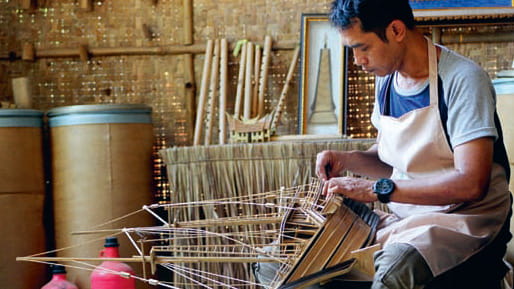
Social enterprise Ecodoe, a YSE 2015 alumnus, works with Indonesian craftsmen to expand their consumer base by providing them with a global platform to sell their products.
ECODOE
Indonesian social enterprise Ecodoe was started by YSE alumnus Larasati Widyaputri in 2015 to help craftsmen sell their handmade products as corporate gifts. Before working with her company, these rural craftsmen made merely US$1.60 (S$2.28) a day and were often forced to abandon their craft and seek work as construction workers. By tapping into Ecodoe’s network, they can now earn up to US$100 (S$228) every week.
Today, the company works with nearly 300 artisans, and has sold over 178,000 souvenirs to over 12,000 clients.
For Widyaputri, the YSE study visit to Mumbai made the greatest impact on her business model. In Dharavi – also known as Asia’s biggest slum – she saw how the local craftsmen were able to expand their reach globally by selling their products through Amazon. This inspired her to transform her consignment business into an e-commerce model. The visit also included business sessions with subsidiaries of leading conglomerate Tata Group that provided key insights into strong corporate governance. At the same time, global nonprofits like Ashoka and UnLtd connected her to their Indonesian representatives, who showed her how to pitch for funding through effective storytelling.
Paramesh Prasad, who works for the shipping branch of the global conglomerate Swire, has been a YSE mentor for several years. Of the many social businesses he has seen at the programme, he says Ecodoe stood out for its conscientiousness.
“It has scaled its business – finding the right channels, understanding the market conditions and seeking funding – in a stepby- step manner, which explains how it was able to turn a good idea into a successful social business.”
